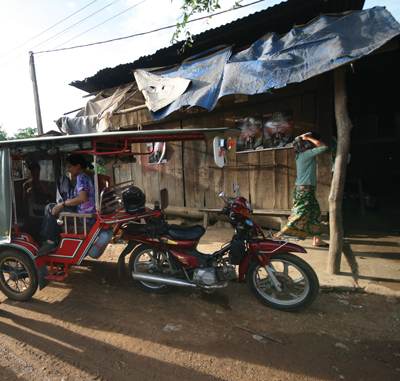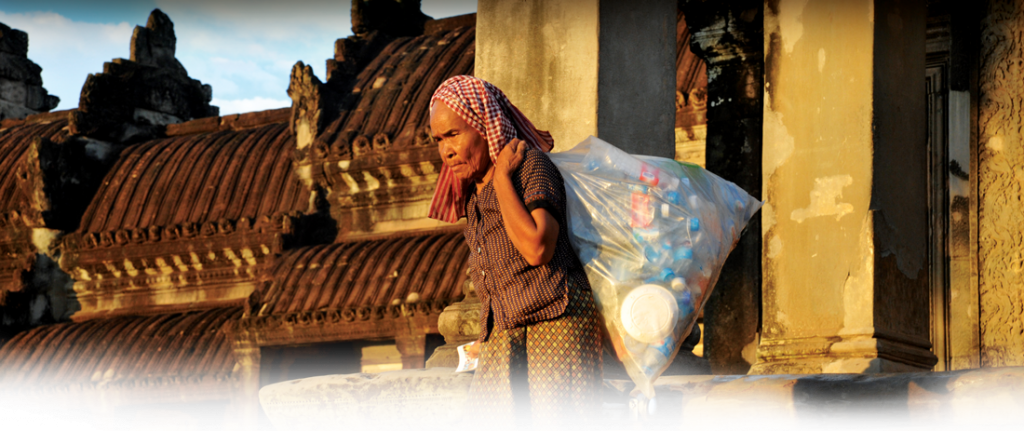Suffering & Hope
Persisting in Love – Ratanak has traditionally gravitated toward projects that do not have a great deal of flare or drama – projects that slowly but surely work to change lives over time, because that’s how true transformation happens. This article about the Ratanak Medical Care Program represents the heart of Ratanak in our day-to-day work with Cambodians. So many acts of love like this are taking place, even today, contributing to long-term transformation of lives.
The tuk-tuk bumped along through muddy puddles, jerking up and down with every new pothole along the city road. An early-afternoon thunderstorm had left the roads of Kampong Cham completely flooded, and I was feeling like a boat would’ve been a much more efficient means of transportation. The four of us in the cab – two nurses, one team leader, and one intern – bounced around in our seats, clinging tightly to bars or seat cushions, until the tuk-tuk came to a sudden stop outside a small wooden house.
 Probably the smallest of all of the buildings on this street, the only thing particularly notable about this house was the large amount of plastic recyclables that spilled out from the doorway. Bottles, chairs, cartons – you name it – they had it all, and it was taking over the whole front part of the already tiny house. When I asked what it was doing there, Mony, one of the program’s nurses, explained that the woman who lived there was a recycler. The Ratanak Medical Care Program had offered her a small business loan to purchase a cart to take all of the plastic to a place where she could sell it, but a recent roadside accident had left her unable to pull the cart, so the mountain of plastic was
Probably the smallest of all of the buildings on this street, the only thing particularly notable about this house was the large amount of plastic recyclables that spilled out from the doorway. Bottles, chairs, cartons – you name it – they had it all, and it was taking over the whole front part of the already tiny house. When I asked what it was doing there, Mony, one of the program’s nurses, explained that the woman who lived there was a recycler. The Ratanak Medical Care Program had offered her a small business loan to purchase a cart to take all of the plastic to a place where she could sell it, but a recent roadside accident had left her unable to pull the cart, so the mountain of plastic was
slowly growing.
Bothra, the other nurse – being unable to reach the door – shouted up to one of the windows, hoping to get a response from someone inside. It took a few minutes before there was a small rustle at the doorway, and the sea of plastic began to part. A stooped woman appeared, cheerily greeting the Medical Care staff and pushing garbage out of the way so that she could join the five of us out on the street. She limped slowly toward us, cradling her left arm close to her thin chest. The skin on the back of her hand was bleached and spotted with dark, crusty scabs. Her right knee was also badly wounded, and there were little patches of pink, bloody flesh around the edges, evidence that she had been picking at it. She smiled and bowed to each of her visitors, revealing a few yellowed or rotting teeth popping up from soft pink gums.
The woman’s daughter brought us plastic chairs to sit on, and we crowded together in a little circle at the edge of the street. They told stories, laughing and using hand gestures to re-enact neighborhood dramas. She explained that she had soaked her hand in hot water because she thought it would make it better, but it had really only caused more pain and scarring – the unfortunate results of a lack of basic medical knowledge. The nurses nodded, took notes, and interrupted with questions from time to time, but mostly they just let her tell them about her hardships. Mostly, they just listened.
When the woman finished talking, Bothra pulled out four tins of colorful pills and handed them to her: two kinds of antibiotics for the infected sores, and two kinds of painkillers for the internal damage. He repeated the instructions more than once, just to be sure that the woman knew when to take each pill. I naively asked why they didn’t write the instructions out for her, so that she would be sure to remember. But, of course, written instructions are only helpful if you know how to read.
Once they were sure that she understood, Mony asked if she was keeping up with her HIV medication. She looked at the ground, and her hand moved toward her knee, where she self-consciously started picking at her scab. Shamefacedly, she admitted that she had missed a few doses. The nurses gently reminded her how important it was for her to take her medicine and asked if there was someone willing to go pick it up for her. Neighbors and friends were out of the question – people who are HIV-positive are stigmatized in Cambodian culture, and typically they are ignored or discriminated against by the people around them. Fortunately, the woman’s husband, who was left undamaged by the motor accident, was able to go to the distribution center to pick up her ARVs (antiretroviral medication) for her.
They continued talking for a little while, but before long it was time for our little troupe to head on. We rose from our chairs, thanked the woman, and started moving to go. The woman stood up as we left, nodding and bowing with gratitude despite the pain in her joints. We piled back into the tuk-tuk and waved goodbye. Within a short thirty minute visit, this woman had received relief from pain, a friendly visit with people who would listen, and acceptance in a community that otherwise pushes her to the margin. She stood at the door, waving and bowing at the Ratanak Medical Care staff nurses as we bumped along down the street, on our way to another visit, another patient somewhere in another house.
Rachel Dale lives in Phnom Penh and is currently interning at Sunrise, the local agency that implements the Ratanak Medical Program. These reflections are from her first patient-visit in Kampong Cham in June.
Give today to help more Cambodians in need

